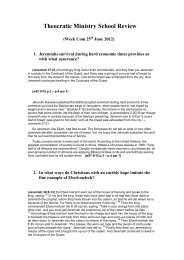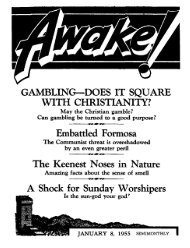1964 Awake! - Theocratic Collector.com
1964 Awake! - Theocratic Collector.com
1964 Awake! - Theocratic Collector.com
Create successful ePaper yourself
Turn your PDF publications into a flip-book with our unique Google optimized e-Paper software.
In this Dickinson case the Supreme<br />
Court had before it the consideration of a<br />
man who was clearly serving in the ministry<br />
as his vocation, being a "Pioneer Minister"<br />
as well as the presiding minister of<br />
a congregation of Jehovah's witnesses. The<br />
Court thus established his right to exemption<br />
from selective service, since he qualified<br />
under its definition of a minister of<br />
religion, having made the ministry his vocation.<br />
The fact that he worked part time<br />
to support himself did not disqualify him<br />
from ministerial status.<br />
On November 26, 1958, a different court,<br />
the United States Court of Appeals for the<br />
Fifth Circuit, had before it the case of another<br />
one of Jehovah's witnesses. He was<br />
not a "Pioneer Minister," but was steadily<br />
employed in secular work, earning about<br />
$50 a week. In this case, Wiggins vs. United<br />
States, the Circuit Court ruled that although<br />
Wiggins had full-time secular employment,<br />
he was entitled to exemption as<br />
a regular or duly ordained minister of religion<br />
because he "stood in the relation of<br />
a religious leader to other members of Jehovah's<br />
Witnesses. He was recognized as<br />
such by individual members and by the<br />
governing body of Jehovah's Witnesses.<br />
The defendant's selective service file shows<br />
numerous uncontradicted certificates and<br />
letters of individual members that support<br />
Wiggins' account of his religious<br />
activities."<br />
The Court said: "Ministers of Jehovah's<br />
Witnesses are not paid a salary, furnished<br />
a parsonage, or even given funds for necessary<br />
expenses to carryon their ministerial<br />
work. As pointed out, they have no<br />
choice except to engage in secular pursuits<br />
in order to obtain funds to make the<br />
ministry their vocation. The Act does not<br />
define a minister in terms of one who is<br />
paid for ministerial work, has a diploma<br />
and a license, preaches and teaches primarily<br />
in a church. The test under the Act<br />
14<br />
is not whether a minister is paid for his<br />
ministry but whether, as a vocation, regularly,<br />
not occasionally, he teaches and<br />
preaches the principles of his religion."<br />
The Court noted that Wiggins was a<br />
Congregation Book Study Conductor, presiding<br />
over this group at Bible study meetings.<br />
It noted that he regularly attended<br />
assemblies of Christian ministers where he<br />
had official duties. The Court also took<br />
cognizance of the fact that he preached<br />
regularly before the congregation, and that<br />
he spent approximately 40 hours a month<br />
in various features of the ministry, such<br />
as preaching from door to door, in Biblical<br />
research and study, conducting weekly<br />
meetings of the congregation, and reading<br />
summary material at such meetings.<br />
Although Wiggins spent about one·<br />
fourth of the amount of time monthly in<br />
the ministry as he did in his secular employment,<br />
the Court stated: "It is not the<br />
sole or necessarily conducive factor. Some<br />
allowance must be made for ministers who<br />
are gainfully employed simply because<br />
they are not paid for their religious ministry.<br />
If they must work, they should not<br />
be penalized for working steadily. A young<br />
man such as Wiggins could hardly work<br />
less than forty hours a week as crane operator<br />
and hold on to his job."<br />
The Vital Factor<br />
The vital factor here was that the young<br />
man had made the ministry his vocation.<br />
His life revolved around his ministry, and<br />
his secular employment was only a means<br />
to sustain him as he pursued his primary<br />
vocation, that of the ministry.<br />
That is just what the Court maintained.<br />
It said: "He regarded this endeavor as his<br />
chief purpose in life, the secular employment<br />
being incidental. He has shown that<br />
he stood in the relation of a religious leader<br />
to other members of his faith, in a<br />
AWAKE/




